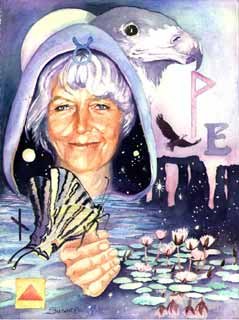A course that attempts to inform ministers about ancient and modern Paganism can only be commended. As such, it was good cross-reference material on a variety of subjects, from gods to elements, divination and runes.
However, I felt that it at times attempted to oversimplify the complexity of the ancient Pagan religions and to make generalizations that, if helpful as a first approach or as a way of categorizing ancient beliefs, do not necessarily reflects these beliefs themselves. For instance, there is very little archeological or historical evidence that ancient Pagans actually revered some form of Triple Goddess and Dual or Quintile God. The only place where Triple Goddesses seem to have been worshiped was Celtic Ireland, and these Triple Goddesses were not viewed as Maiden/Mother/Crone. It seems to be now an accepted fact that the latter representation was a literary creation of author Robert Graves in his book ‘The White Goddess’ published in 1948.
This generic comment does not diminish the potential usefulness of such classification in an attempt to show parallels between various forms of Pagan worship, to channel the student’s understanding, or to demonstrate some form of unity in worldwide religious views. However, the course does not seem to have that purpose, although this could have been an attempt to build a modern set of Pagan beliefs on the basis of ancient Paganism. As such, it would be a valuable effort.
The ancient Paganism – and the diversity of the belief systems of pre-Christian times warrants the use of the plural – were much more varied than our monotheistic culture is willing or able to recognize. However, Polytheism by definition is tolerant of other Gods and Goddesses, and the various forms of Paganism widely influenced each other. The late Roman Pantheon, by then predominantly Greek, is a typical example of this evolution. Even within one Tradition, local variations were many.
The main common characteristic of ancient Pagan religions were, first, a belief in countless supernatural creatures of varying degrees of power, second, the hope that these creatures are benevolent – except those who have been rendered malevolent by magic – and can grant prayers, third, that one or more of them specifically protects a nation or a location, and fourth, a number of various rites not necessarily linked to one of these particular creatures, but rooted in the hopes and fears raised by life in the ancient world. Such religions were by nature open to the cross-fertilization mentioned above, were devoid of mandatory creed and often without a universal leader or central place of worship, and were an integral part of the local culture. They answered the basic spiritual and social needs of the people of the time.
In that sense, attempting to reconstruct ancient Pagan religions can be inherently treacherous. First of all, lots of information on ancient Pagan practices and beliefs is missing, and therefore our understanding of these religions could be limited. Moreover, and probably more importantly, ancient Pagan religions were an integral part of the culture and society of the time. They cannot be understood without a deep understanding of these societies, and they cannot be practiced efficiently outside of these societies. A good example is Druidism, which cannot be practiced as it was – if at all – without druids actually acting as royal advisors, jurists and keepers of knowledge, in addition to being priests.
This should nevertheless not prevent us from using the principles of ancient Pagan religions in new religions, namely some form of neo-Paganism. Images of ancient Paganism, such as some of the Gods and Goddesses, are still as strong today as they were then and can be powerful catalysts of a modern faith, but one that would remain somewhat distant from that of our remote ancestors. I think that the course succeeded in conveying that message, although it did not explicitly do so.
Rev. Baudouin Heuninckx
*******************************
The Universal Life Church is a comprehensive online seminary where we have classes in Christianity, Wicca, Paganism, two courses in Metaphysics and much more. I have been a proud member of the ULC for many years and the Seminary since its inception.
The Universal Life Church offers hand-fasting ceremonies, funeral ceremonies and free minister training.
As a long time member of ULC, Rev. Long created the seminary site to help train our ministers. We also have a huge selection of Universal Life Church minister supplies. Since being ordained with the Universal Life Church for so many years and it's Seminary since the beginning, I've watch the huge change and growth that has continued to happen.
Try our new free toolbar at: ULC Toolbar
 Universal Life Church
Universal Life Church





No comments:
Post a Comment